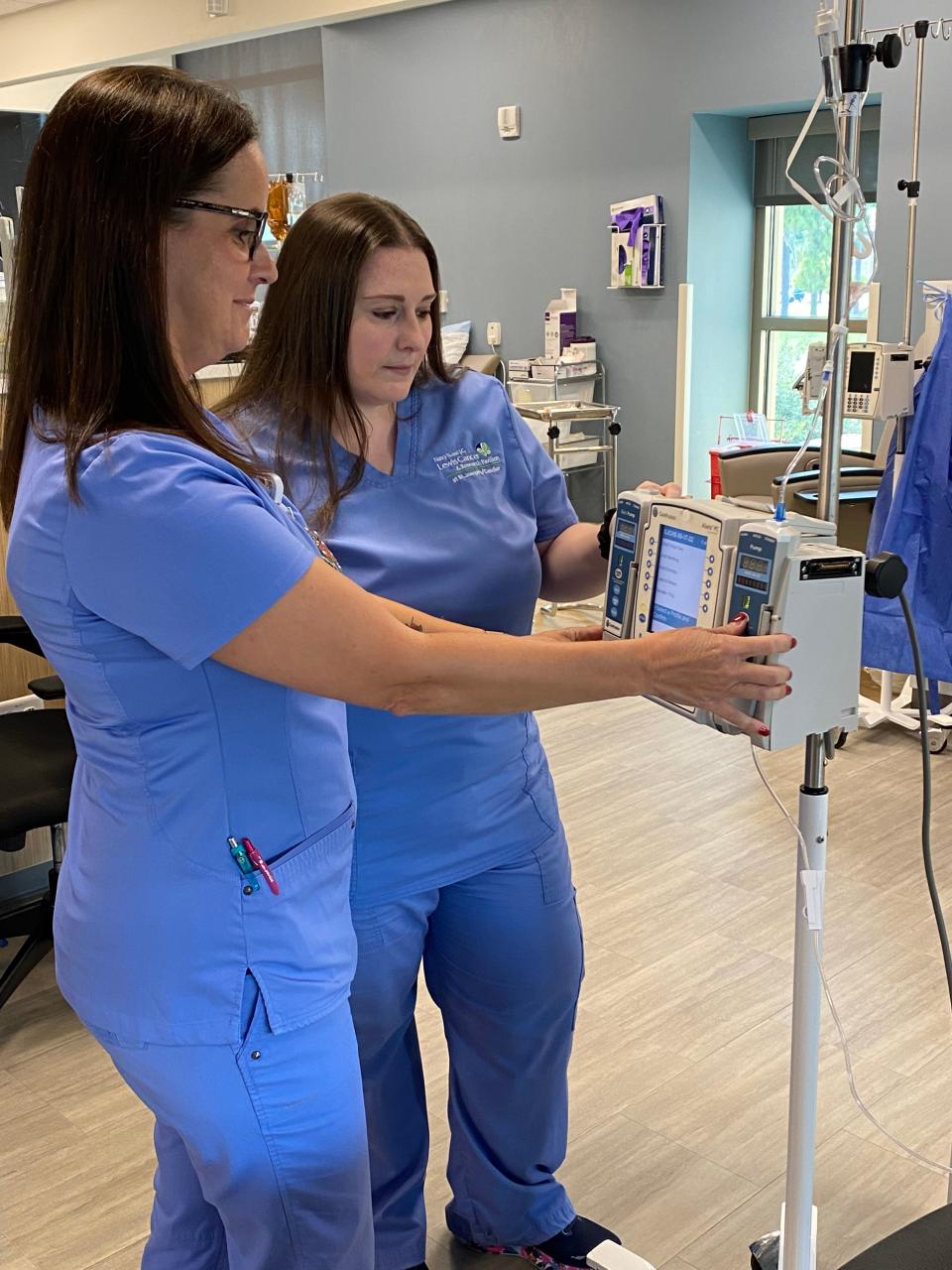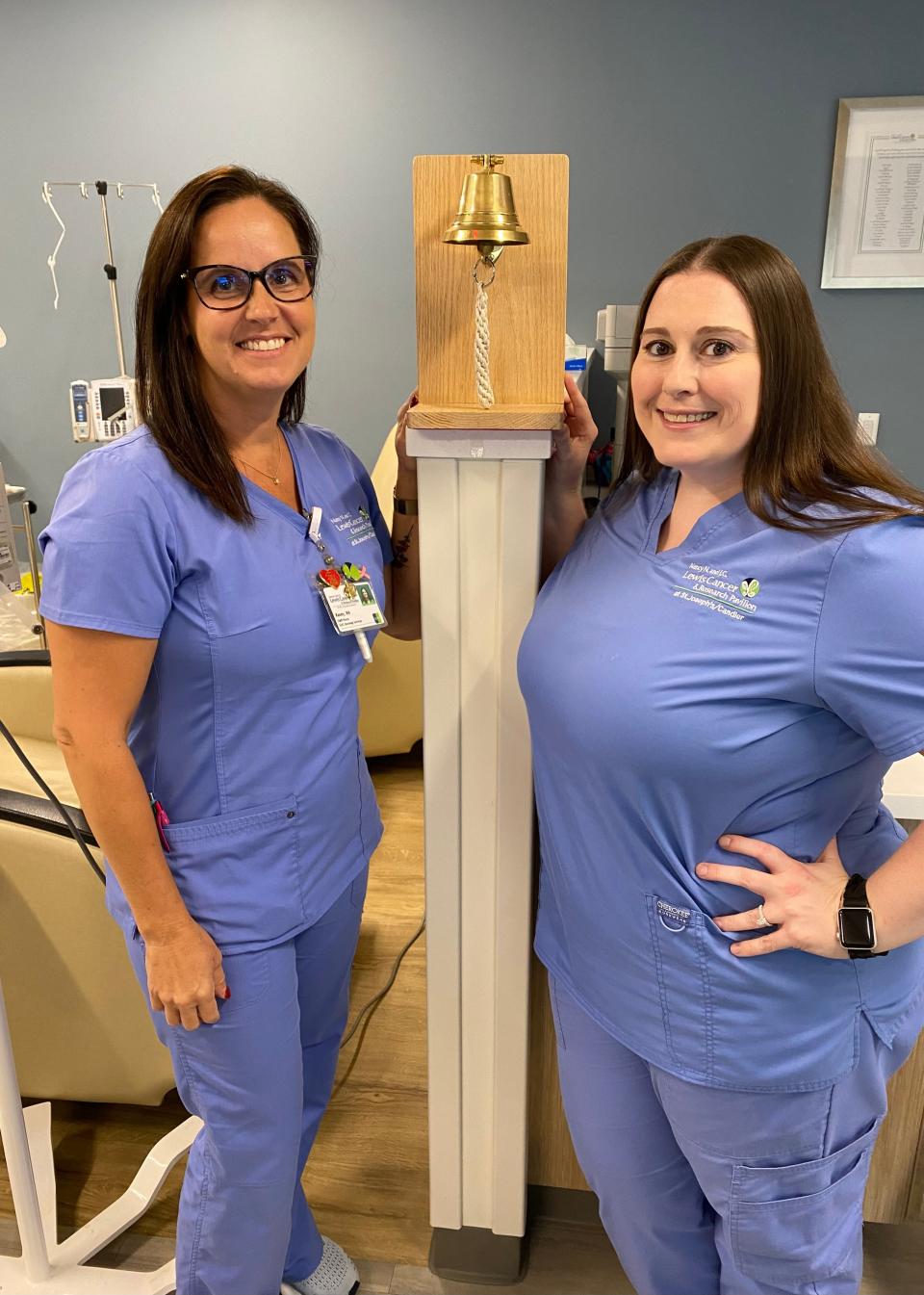When it comes to cancer treatments, oncology nurses provide good medicine
A breast cancer patient’s journey begins with a team of medical experts that often includes a primary care physician, pathologist, medical and surgical oncologist, reconstructive surgeon, and pain specialist – all of whom provide essential care. But ask most anyone who has gone through chemotherapy treatments and they’ll tell you some of the most important people on their journey are oncology nurses. Likewise, ask an oncology nurse who positively impacts their life, and they’ll tell you it’s their patients.
“They’re so humble,” says Celeste Wiggins, RN, an oncology nurse at Nancy N. and J.C. Lewis Cancer and Research Pavilion. “They’re on this life-and-death journey and relying on us because we’re helping them get through it, so we become part of their story and they become part of ours as well.”
Oncology nurse specialists such as Celeste provide whole-person care, nurturing a patient’s spiritual and emotional wellbeing in addition to addressing their medical needs. They are by the patient’s side from the initial discussion of treatment, tend to them during their first chemotherapy session and every treatment thereafter, offering education, comfort and a listening ear.
“Sometimes patients just need someone who will listen,” says Kasey Strickland, RN, who works alongside Celeste at J.C. Lewis. “They can talk or cry it out. I’m there to listen and answer questions.”
“Sometimes we’ll be sharing stories with them, too,” Celeste adds, “just trying to make them feel as at home as possible.
The result? “They start off as a patient, but when they leave, they leave as family,” says Kasey.
Early Detection: Breast Cancer by the Numbers: near 100% survival rate when caught in earliest stages
Targeted Therapy: Advanced precision in breast cancer radiation treatment reduces side effects

'You try to make it the best experience you can'
Some of this connection is because of the sheer amount of time the nurses and patients spend together – sometimes several hours multiple times a week. But it’s mostly about the quality of the time shared.
“We give them the education that they need, their treatments, and try to make it a fun experience even though it’s a really one of the most difficult times in their life,” says Kasey. “You try make it so they aren’t focused solely on the cancer and chemo. You try to make it the best experience you can.”
“I’m like a big clown,” Celeste adds. “I love to make my patients forget about their cancer and forget about their treatment. I try to do everything I can to get them to laugh or smile – that’s my goal for the day.”
In return, patients show their profound appreciation. “Sometimes they bake goodies and cakes,” says Kasey. “But their voice and their gratitude are all that I need – or just knowing that they’re getting better.”
Celeste and Kasey both point to the ceremonious “ringing of the bell” – a tradition at Lewis Cancer and Research Pavilion upon a patient’s completion of their chemotherapy treatments – as an incredibly fulfilling moment for everyone.
“We all get together and start clapping, and we’ll either play “Ring My Bell,” or “Celebration,” or if a patient has a song they want to hear, we’ll play that,” Celeste says. She adds how the other patients look on and clap as well, giving everyone a healthy boost of joy and hope.
In spite of these celebratory moments, there’s a general misunderstanding that working in oncology is mostly sad and arduous, a stigma which might prevent young nurses from entering the specialty. But Celeste and Kasey argue that it’s actually one of the most rewarding.
Celeste spent the first decade of her nursing career at St. Joseph’s/Candler, first on the pulmonary floor and then moving to the OR. One day, a friend told her about an open position at J.C. Lewis and encouraged Celeste to apply.
“She said the patients are amazing, and the doctors are so compassionate. It’s just a different environment.” While Celeste enjoyed working in the OR, she eventually thought, Let’s just try this. “It was like oncology kind of chose me,” she says. “I fell in love with the patients and physicians. Our whole team is really like a family. It’s a really nice environment.”

'This is my calling'
Kasey, who’s been a nurse for 23 years, came to her position at J.C. Lewis in a similar way. Less than two years ago, a former colleague called her, saying she needed to come to oncology and adding that she’d be “a perfect fit.”
“It’s been the best decision that I’ve ever made,” Kasey says. “I’ve done different types of nursing throughout my career, and I feel like I get the most fulfillment from this job and from my fellow nurses because oncology is completely different. It’s such a wonderful group of nurses that I couldn’t imagine going anywhere else.”
Still, Kasey acknowledges that there is an emotional toll when patients pass, especially when she’s gotten to know them and their families so well. She says focusing not on their passing, but rather the time they got to spend together and how she was able to make the experience as good as possible, makes things easier.
“Sometimes I come home and cry,” Celeste concedes, “but we rely on each other and my family is a good support system for me, too.”
But neither woman would have it any other way. “This is my calling,” Kasey says. “This is where God placed me, and this is where I want to be until my end.”
This article originally appeared on Savannah Morning News: breast cancer awareness special edition oncology nurses follow their calling

